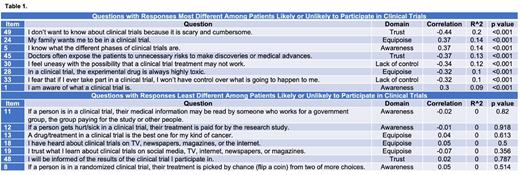Abstract
Background: The key to therapeutic advancements and improvement in patient (pt) outcomes is the development of novel treatments, which can only be achieved by prospective, systematic clinical trials (CTs). Effective recruitment and retention of CT participants is crucial for their timely success. Yet, a majority of cancer pts in the US never participate in CTs. For multiple myeloma (MM), the second most common hematological malignancy, as per an estimate <3% of pts participate in CTs. Several hypotheses have been proposed for why cancer pts may not want to join CTs, but a controlled pt perspective study in a uniform cohort exploring their understanding and preferences towards CTs has not been done.
Methods: A prospective online survey was conducted on a cohort of pts with MM, enrolled on the Healthtree® Cure Hub platform, which also includes demographic data of each pts. The survey included 51 questions (Qs) evaluating the pt's knowledge and attitudes about CTs, was voluntary and conducted in English language. Additionally, pts were asked how likely or unlikely they would be to participate in a clinical trial (all Qs were scored on a 5-point Likert scale: strongly agree, agree, neither agree nor disagree, disagree, and strongly disagree). None of the questions were mandatory. The questionnaire consisted of 5 domains: awareness of CTs (12 Qs), clinical equipoise (16 Qs), fear of unknown/lack of personal control (5 Qs), media influence (3 Qs), trust (including trust of physicians, pharmaceutical companies, and regulatory agencies; 15 Qs). Data for any missing responses was not imputed. The relationship between MM pt's likeliness to join a clinical trial and the question was evaluated using a Pearson's correlation coefficient and linear regression (R^2).
Results: The survey was completed by 214 pts born in 17 countries with the majority (86%) from the US. Median age of respondents was 66 years (range: 41-84) with 50.5% females and 49.5% males. 94% had some college or higher degree while 6% had high school diploma or lesser. Pt ethnicity was non-Hispanic in 77%, Hispanic in 17% and 7% did not provide this information. Among this highly-engaged, technologically savvy online pt community, 86.8% respondents somewhat or very likely to join CTs, 7.8% were neutral and 5.4% were somewhat or very unlikely to join CTs. There were 8 Qs which were significantly different between those likely or unlikely to join CTs, with sufficient variance. These Qs along with the domain they belonged to, and the statistical results are shown in Table 1. In contrast, we looked for Qs that were least variant and distinct among those likely or unlikely to participate in clinical trials (Table 1). To analyze the likelihood of joining a clinical trial on a bivariate scoring scale, analyses were done by combining the likely cohort (very likely plus somewhat likely) with the neutral cohort vs. the unlikely cohort (very unlikely and somewhat unlikely); as well as comparing the likely cohort vs. the neutral cohort with the unlikely cohort. For both these analyses, the same 3 Qs were significantly different: "Q 17. People who are in a clinical trial are like a guinea pig” (clinical equipoise), "Q 24. My family wants me to be in a clinical trial” (clinical equipoise), "Q 34. If my doctor recommends that I participate in a clinical trial, I would agree as I trust that he/she knows what he/she is doing” (trust).
Conclusions: Unfortunately, the majority of CTs conducted in the US have difficulty in achieving their target accrual, and several remain incomplete due to lack of adequate pt participation. While participation in CTs is absolutely voluntary, pt understanding or lack thereof, as well as their beliefs can shape their behavior and attitudes towards CTs. Notably, this prospective study reports significant results in a highly-engaged cohort with uniform diagnosis, exploring various aspects of pt understanding and behavior towards CTs, and uncovers several aspects that are significantly different among those who are likely or unlikely to participate in CTs. Additionally, there were other aspects which were highly overlapping among the two groups and may not be a beneficial strategic focus in order to improve CT accrual. In summary, a CT awareness platform explaining the nuances of clinical equipoise, administered by the pt's doctor while including their support system (family/friends) is likely to positively impact their attitude towards CT enrollment.
Disclosures
Manochakian:Alpha 2: Membership on an entity's Board of Directors or advisory committees; Astrazeneca: Membership on an entity's Board of Directors or advisory committees; Guardant Health: Membership on an entity's Board of Directors or advisory committees; Janssen: Membership on an entity's Board of Directors or advisory committees; Takeda: Membership on an entity's Board of Directors or advisory committees; Turning Point: Membership on an entity's Board of Directors or advisory committees; Novocure: Membership on an entity's Board of Directors or advisory committees. Ahlstrom:Pfizer, BMS, Janssen, Takeda Oncology, Sanofi: Consultancy, Honoraria, Membership on an entity's Board of Directors or advisory committees.
Author notes
Asterisk with author names denotes non-ASH members.


This feature is available to Subscribers Only
Sign In or Create an Account Close Modal